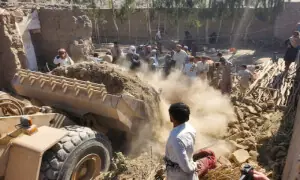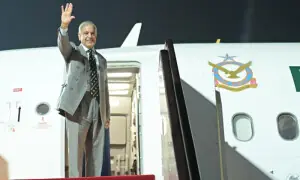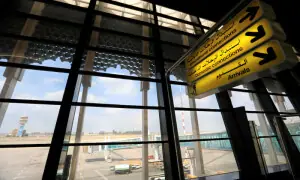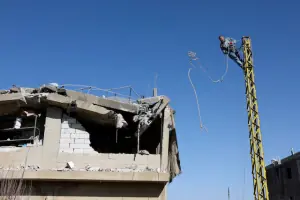Airlift begins for Afghans who worked for U.S. during long military campaign
2 min readBy Jonathan Landay
Some 200 Afghans were set to begin new lives in the United States on Friday as an airlift got under way for translators and others who risk Taliban retaliation because they worked for the U.S. government during its 20-year war in Afghanistan, U.S. officials said.
The operation to evacuate U.S.-affiliated Afghans and family members comes as the U.S. troop pullout nears completion and government forces struggle to repulse Taliban advances.
The first planeload of some 200 evacuees were expected to be bused to Fort Lee, a U.S. military base in Virginia, for final paperwork processing and medical examinations.
The Afghans who worked for the United States are being granted Special Immigrant Visas (SIV) entitling them to bring their families. As many as 50,000 or more people ultimately could be evacuated in "Operation Allies Refuge."
The first group is among some 2,500 SIV applicants and family members who have almost completed the process, clearing them for evacuation, said Russ Travers, President Joe Biden's deputy homeland security adviser.
The Afghans were expected to remain at Fort Lee for up to seven days before joining relatives or host families across the country.
The evacuees underwent "rigorous background checks" and COVID-19 tests, Travers added. Some were already vaccinated, and the rest will be offered jabs at Fort Lee.
The surging violence in Afghanistan has created serious problems for many SIV applicants whose paperwork is in the pipeline amid reports - denied by the Taliban - that some have been killed by vengeful insurgents.
Some applicants are unable to get to capital Kabul to complete required steps at the U.S. embassy or reach their flights.
"We do lack the capacity to bring people to Kabul from other parts of the country or to house them in Kabul," Tracey Jacobson, State Department coordinator of the operation, told reporters.
The SIV program has been plagued by long processing times and bureaucratic knots - which the Biden administration and Congress are working to undo - that led to a backlog of some 20,000 applications. The State Department has added staff to handle them.
"The U.S. has had 20 years to anticipate what the withdrawal would look like," said Adam Bates, policy counsel for the International Refugee Assistance Project, which provides legal aid to refugees. "It's unconscionable that we are so late."
Kim Staffieri, co-founder of the Association of Wartime Allies, which helps SIV applicants, said surveys the group has conducted over Facebook show that about half of SIV applicants cannot reach Kabul, including many approved for evacuation.
Congress created SIV programs in 2006 for Iraqi and Afghan interpreters who risked retaliation for working for the U.S. government.
For the latest news, follow us on Twitter @Aaj_Urdu. We are also on Facebook, Instagram and YouTube.
























Comments are closed on this story.